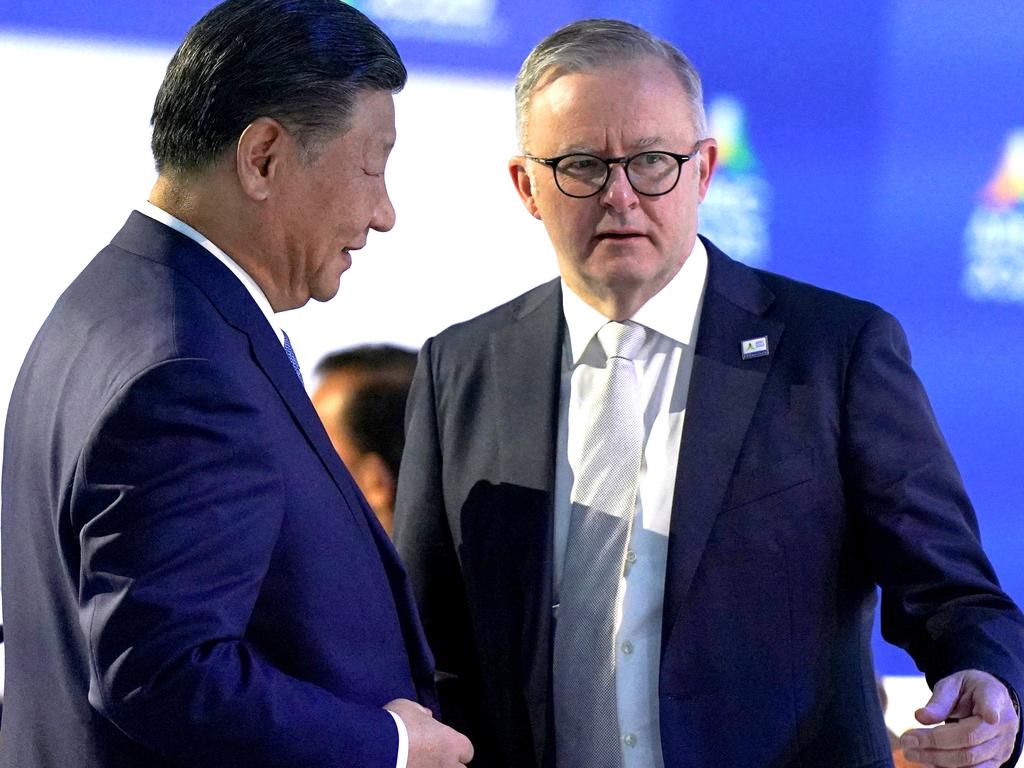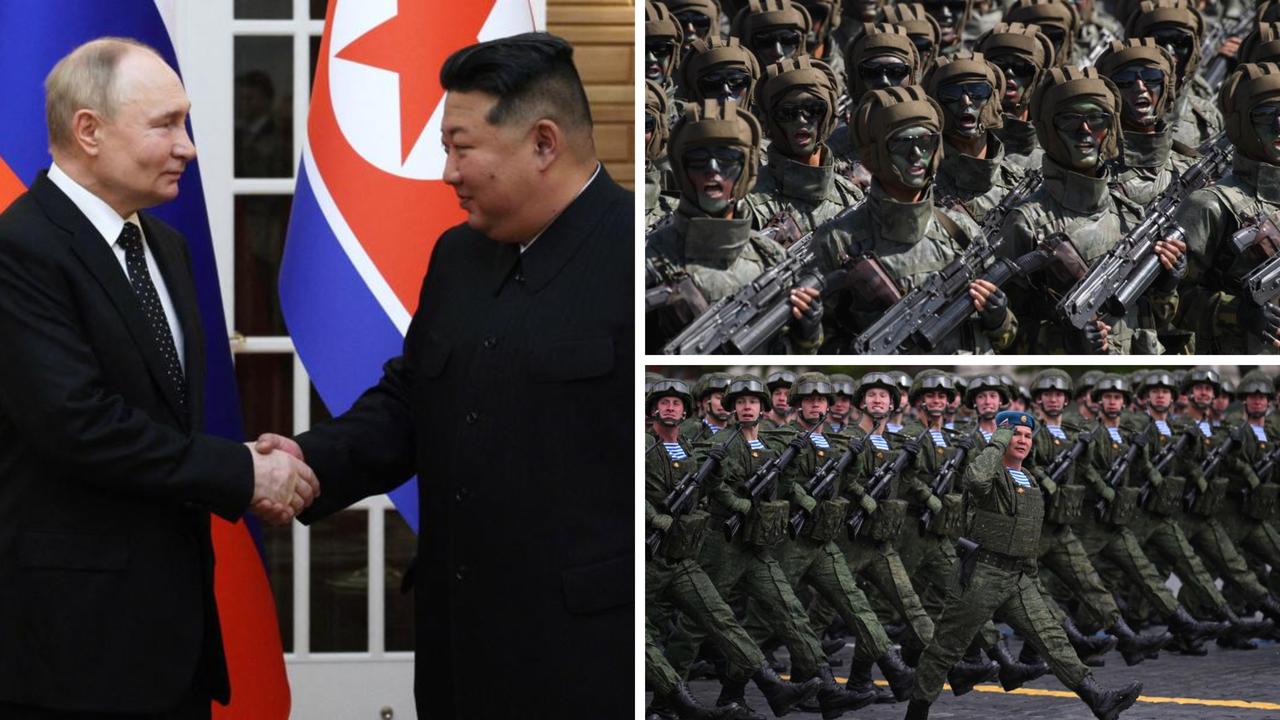‘Shooting will start’: Fears over China-Australia escalation
“Risky behaviours” by China towards Australia could be pointing to a dangerous escalation which could blow up any moment.

ANALYSIS
Beijing’s acoustic assault on an Australian warship last week follows a well-established pattern: China is pushing hard in the legal ‘grey zone’ beneath an outright act of war. But it’s a deadly game. All it takes is one mistake for the shooting to start.
Two Royal Australian Navy (RAN) divers were injured last week when a Chinese warship activated its sonar close to HMAS Toowoomba.
The Australian frigate was disabled in international waters at the time. Its propellers were tangled in a fishing net. The divers were attempting to cut it away.

The Chinese destroyer PLAN Ningbo reportedly acknowledged it had received HMAS Toowoomba’s warning that it had divers in the water. But it physically assaulted them with powerful underwater soundwaves, regardless.
“The Chinese vessel’s behaviour was not the result of a misunderstanding or a lack of communication,” argues security analyst Markus Garlauskas and retired US Rear Admiral Philip Yu. “At a minimum, this behaviour was unsafe and unprofessional by the standards of international law and maritime norms and conventions. However, this was not an isolated instance, and taken in full context, it almost certainly amounted to an intentional, if nonlethal, acoustic aggression for coercive purposes.”
Former British Royal Navy warship captain Tom Sharpe agrees.
“In this case, either the PLAN have done the sums on how much power to put into the water at their chosen range to ‘injure not kill’, they were guessing, or they had no idea what effect it could have. I’ll let you decide which is more worrying,” he writes for UK media.

But the political uproar within Australia, confused international analysts, and uncertain reactions may be exactly what Beijing wants.
“It’s classic grey zone stuff, specifically designed to make a conventional response difficult,” Sharpe adds.
It’s also known as “lawfare”. Plausible deniability. Brinkmanship. Intimidation.
Basically, it’s the idea that bullying will get you whatever you want.
China’s defence ministry spokesman Wu Qian this week called Australia’s account of the incident “completely untrue” and that Beijing has issued a formal protest to Canberra.
“We urge the Australian side to respect the facts, stop making reckless and irresponsible accusations against China, do more to build up mutual trust between the two sides, and create a positive atmosphere for the sound development of relations between the two countries and two militaries,” Wu said.
Pushing the limits
Shortly before the HMAS Toowoomba incident, the US released a list of recent “risky behaviours” by China against Australian, Canadian, Philippine and US vessels and aircraft.
The list of physical assaults includes the use of water cannons, lasers and dangerous manoeuvres. But most of these incidents have been between coast guard, militia and fishing vessels. Not warship to warship.
Assistant Secretary of Defense Ely Ratner called this a “co-ordinated campaign”.
He said this emphasised the need to restore military-to-military lines of communication between the Pentagon and Beijing.
But not everybody is convinced this will change anything.
“First, the communications channels will likely simply be used by the PRC to repeat the “party line” about what occurred in an incident rather than sharing any meaningful new facts,” Garlauskas and Yu argue in an essay for the Atlantic Council think tank.
And the party line was exactly Beijing’s response to Australia’s complaint over the injuries to HMAS Toowoomba’s crew.
“Second, the Chinese will likely deflect any US efforts to use a bilateral PRC-US line of communication to discuss PRC (People’s Republic of China) military interactions with a US ally’s forces.
“Third, the PRC is unlikely to live up to any agreements reached through such channels.”

They point to China’s past behaviour as evidence for this.
It promised not to militarise its illegal island outposts in the South China Sea. But it did.
It repeatedly promises to respect the United Nation’s International Law of the Sea (UNCLOS). Then it asserts it doesn’t apply anyway.
Also, In 2014, Beijing signed an agreement detailing the Rules of Behaviour for Safety of Air and Maritime Encounters based on long-established international law and conventions. That’s what should have been applied during the HMAS Toowoomba incident.
“The PRC has repeatedly and flagrantly violated the letter and the spirit of the memorandum, as it did in this latest incident,” Garlauskas and Yu write.
The risks of brinkmanship
“If this escalation is not blunted, a servicemember from a US ally could be killed by these tactics,” state Garlauskas and Yu. “(This) would present a dangerous test of the resolve of the United States and allies to take the risks involved in standing up to Beijing — regardless of what channels exist to communicate with the PRC military.”
Sharpe, who has commanded warships himself, says this risk would have weighed heavily on the mind of HMAS Toowoomba’s captain during the crisis.
“Clearly, you’re going to get back on the radio telling them in much stronger terms to stop using their sonar. But what else?” he asks. “Searchlights, sounding sirens, uncovering weapons, crewing and then training them – all standard escalatory measures. If they had fired a burst of small calibre ammunition in the general direction of your diving boat – a reasonable comparison – you would almost certainly fire back, invoking your inherent right to self-defence. Or would you?”

These are the sort of snap decisions military commanders on the scene have to make.
These are the sort of snap decisions political pundits quickly forget when spinning a crisis to their own ends.
“No commanding officer wants to be the one that starts ‘the war’, so having political and legal backing from home command helps a great deal if you end up being the one who has to take action because you believe the lives of your ship’s company are suddenly at risk,” Sharpe states.
These commanders also need clear allied messaging that they won’t back down.
“If this can’t be done, sooner or later the shooting will start,” he concludes.
But Beijing knows Washington is under immense pressure – both from within and without.
“One reason China might purposefully cross the line is that Beijing perceives Washington to be overly distracted with supporting Ukraine against Russia in Eastern Europe, and now Israel against Hamas and potentially Hezbollah and Iran in the Middle East,” argues RAND Corporation defence analyst Derek Grossman in the University of Texas’ War on the Rocks blog. “Indeed, Beijing may have authorised the latest and riskiest ramming manoeuvres in order to test American resolve while conflicts on the other side of the world are competing for Washington’s attention.”
China throws its weight around
“As the saying goes, ‘When elephants fight, it is the grass that suffers.’ If there are only some frictions between China and the US, it could have serious consequences for the countries involved,” Communist Party international relations academy director Chen Zhuo asserts in a Global Times editorial.
The threat was aimed at Manila.
Nevertheless, this week, the US and the Philippines launched joint air and sea patrols over the archipelago’s South China Sea territories. Australia has also announced its decision to support Manila this way.
These territories were judged to belong to the Philippines after a 2015 International Court of Arbitration rejected China’s claim of historical ownership over the Spratly Islands as “without foundation”.
Beijing has ignored the ruling.
The Philippines, despite the enormous disparity in military strength between it and its distant neighbour, has decided to stand up for its rights.
“Unfortunately, this policy choice is based on an incorrect assessment of its own situation and the international environment, and it may not be prepared for the consequences of this choice,” Zhuo warns.
But Center for Strategic and International Studies (CSIS) analysts Greg Polling and Jude Blanchette argue in a recent Australian Strategic Policy Institute (ASPI) essay that such belligerence by Beijing “plays right into Washington’s hands”.
“Beijing’s unwillingness to treat the concerns and grievances of its regional neighbours as legitimate has now become one of the most prominent challenges to its management of external relations,” they write.
More Coverage
“In China’s long-embedded view of regional hierarchy, smaller states are historically and necessarily subservient to Beijing in the Asian pecking order. Long legacies of traditional tributary state relations with China, as well as the historical dominance of Chinese culture, language and economic power in the region, still linger in the minds of Beijing’s decision-makers.”
The greatest threat to Washington’s attempts to rally South Korea, Japan, Taiwan, the Philippines, Malaysia, Indonesia and India into a defensive alliance is, they say, is Beijing simply being reasonable: “Should Beijing adjust course and begin treating regional actors as partners, not irritants, Washington’s Indo-Pacific strategy may face its greatest challenge yet.”
Jamie Seidel is a freelance writer | @JamieSeidel






